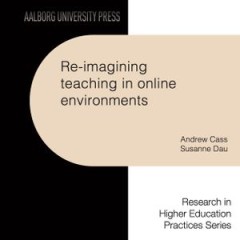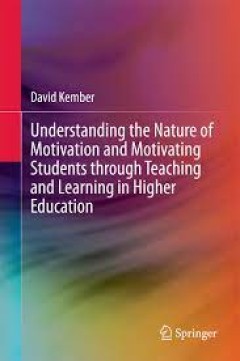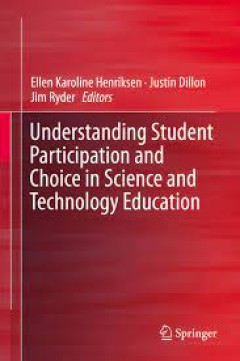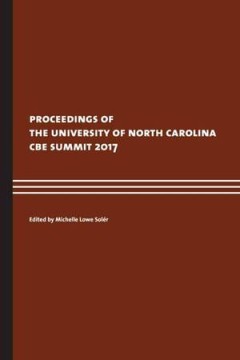Filter by

Re-imagining teaching in online environments
The latest instalment of the Higher Education Practices Series developed by the Higher Education Research Unit in the Department for Learning and Philosophy at Aalborg University. This book continues the tradition of producing timely syntheses of research on higher education topics of international importance. This booklet delves into research findings specifically on the topics of Rich Environ…
- Edition
- -
- ISBN/ISSN
- 9788772102726
- Collation
- -
- Series Title
- -
- Call Number
- 370 CAS r

University Autonomy Decline: Causes, Responses, and Implications for Academic…
This book provides empirically grounded insights into the causes, trajectories, and effects of a severe decline in university autonomy and the relationship to other dimensions of academic freedom by comparing in-depth country studies and evidence from a new global timeseries dataset. Drawing attention to ongoing discussions on standards for monitoring and assessment of academic freedom at regio…
- Edition
- Ed. 1
- ISBN/ISSN
- 9781000814088, 9781032307565
- Collation
- 227
- Series Title
- -
- Call Number
- 378 UNI u

Unequal Partners American Foundations and Higher Education Development in Af…
This book offers a nuanced analysis of a US-led foundation initiative of uncommon ambition, featuring seven foundations with a shared commitment to strengthen capacity in higher education in Sub-Saharan African universities. The book examines the conditions under which philanthropy can be effective, the impasses that foundations often face, and the novel context in which philanthropy operates t…
- Edition
- -
- ISBN/ISSN
- 978-1-137-59348-1
- Collation
- -
- Series Title
- -
- Call Number
- -

Understanding the Nature of Motivation and Motivating Students through Teachi…
This book is based upon three interrelated open naturalistic studies conducted to better characterise the motivational orientation of students in higher education. Open semi-structured individual interviews were conducted with undergraduates, students at community colleges and students in taught postgraduate courses in Hong Kong. The analysis used an exploratory grounded theory approach and res…
- Edition
- -
- ISBN/ISSN
- 978-981-287-883-0
- Collation
- -
- Series Title
- -
- Call Number
- -

Understanding Student Participation and Choice in Science and Technology Educ…
Drawing on data generated by the EU’s Interests and Recruitment in Science (IRIS) project, this volume examines the issue of young people’s participation in science, technology, engineering and mathematics education. With an especial focus on female participation, the chapters offer analysis deploying varied theoretical frameworks, including sociology, social psychology and gender studies. …
- Edition
- -
- ISBN/ISSN
- 978-94-007-7793-4
- Collation
- -
- Series Title
- -
- Call Number
- -

Higher Education in Romania: Overcoming Challenges and Embracing Opportunities
This open access book includes a series of relevant policy research articles, elaborared in the framework of the “Quality in higher education: internationalisation and databases to enhance the Romanian education system” project, implemented by the Executive Agency for Higher Education, Research, Development and Innovation Funding (UEFISCDI), together with the Ministry of Education. The proj…
- Edition
- -
- ISBN/ISSN
- 9783030944964
- Collation
- -
- Series Title
- -
- Call Number
- -
Higher Education: Handbook of Theory and Research
Published annually since 1985, the Handbook series provides a compendium of thorough and integrative literature reviews on a diverse array of topics of interest to the higher education scholarly and policy communities. Each chapter provides a comprehensive review of research findings on a selected topic, critiques the research literature in terms of its conceptual and methodological rigor and s…
- Edition
- 1
- ISBN/ISSN
- 978-3-319-26828-6
- Collation
- XIV, 663
- Series Title
- Higher Education: Handbook of Theory and Research
- Call Number
- 371 HIG
Higher Education: Handbook of Theory and Research Volume 30
Published annually since 1985, the Handbook series provides a compendium of thorough and integrative literature reviews on a diverse array of topics of interest to the higher education scholarly and policy communities. Each chapter provides a comprehensive review of research findings on a selected topic, critiques the research literature in terms of its conceptual and methodological rigor and s…
- Edition
- -
- ISBN/ISSN
- 978-3-319-12834-4
- Collation
- XIII, 603
- Series Title
- -
- Call Number
- 371 HIG

Higher Education, Stratification, and Workforce Development Competitive Adva…
This work analyses how political economic shifts contribute to competition within higher education systems in the US, EU, and Canada. The authors highlight competition for prestige and public and private subsidies, exploring the consequences of these processes through theoretical and empirical analyses. Accordingly, the work highlights topics that will be of interest to a wide range of audience…
- Edition
- -
- ISBN/ISSN
- 978-3-319-21511-2
- Collation
- VI, 360
- Series Title
- -
- Call Number
- 371 HIG

Proceedings of the UNC CBE Summit 2017
The University of North Carolina CBE Summit 2017 offered faculty and staff from around the country an opportunity to learn about competency-based education (CBE) models. CBE enables students to earn academic credit based on content proficiency rather than the amount of time spent enrolled in a course. For the 300 participants at the Summit, the sessions focused on broad challenges to implementi…
- Edition
- -
- ISBN/ISSN
- 9781469641928
- Collation
- 90 halaman
- Series Title
- -
- Call Number
- 370 PRO
 Computer Science, Information & General Works
Computer Science, Information & General Works  Philosophy & Psychology
Philosophy & Psychology  Religion
Religion  Social Sciences
Social Sciences  Language
Language  Pure Science
Pure Science  Applied Sciences
Applied Sciences  Art & Recreation
Art & Recreation  Literature
Literature  History & Geography
History & Geography